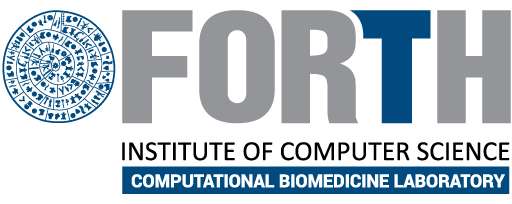The biomodeling group is part of the Computational Medicine Laboratory [CML], of FORTH.
Our purpose is to deliver new high quality research tools and services for efficient health care delivery and effective medical knowledge to the worldwide clinical practice.
Sharing the vision of the vision of the Virtual Physiological Human (VPH) community, our group is heavily involved in developing patient-specific multiscale computer based (in silico) models aiming towards a better understanding of the physiology and the pathology of human organs, with a special focus on the human brain.
One of the major concerns in clinical practice and treatment of life threatening diseases, i.e. Cancer, is the fastest possible transform of scientific discoveries arising from diverse scientific fields such as laboratory, clinical or population studies and in silico predictive models of various disease staging, into clinical applications in order to reduce their incidence, morbidity and mortality.
In the case of predictive oncology using models of cancer growth/ therapy, the integration of all scientific components required is a difficult task since they are both heterogeneous in nature and are performed by a number of scientists from different disciplines. In a typical scenario, imaging data should be transferred from the hospital to a central server where engineers perform typical cancer analysis tasks (e.g. segmentation, multi-modality registration/fusion, signal analysis), in order to extract as much morphological (e.g. 3D shape from MRI), and physiological (e.g. metabolic information from PET), cancer information as possible. Such multi-modal information is then used by cancer modelers as ‘initial condition’ and models of cancer growth/therapy are then applied to simulate either the free growth of cancer or the therapy outcome, over time. In addition, as more scientific discoveries and cancer image modalities will come forward such a workflow might become more and more complex and distributed.




